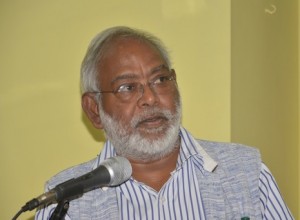Articles
The Loudness of Selective Silence
Opinion | Articles | John Dayal | 15-Mar-2022

To me, as a reporter and human rights activist for more than half a century, a marker of individuals, groups and societies has been not their loud protestations in support of what they hold dear, but the loudness of their silence on issues that possibly speak of the evolution of mankind as a social species. These could be the massive issue of war-mongering by neighbours, or super-powers, on the one hand through, nuclear and chemical weapons, savaging the urban homeless, all the way to the matter of the death penalty, or capital punishment as it is called in quasi legal jargon.
A record 38 persons have recently been sentenced to death in the 2008 chain bombings in Mumbai. All the convicts are Muslims. They were said to be protesting the demolition of the Babri Mosque in Ayodhya, and the chain of violence that followed included he massacres in Gujarat in 2002 where Narendra Modi was then Chief Minister.
The terrible bombings were certainly carried out in a well-planned and extended conspiracy and the culprits deserve exemplary punishment. The judge said the perpetrators of this monstrous act could not be allowed to live in society. Earlier, another judge in another court in another case had used near similar words in another death sentence, adding dearth would also be a salve to the nation’s consciousness”.
On August 31, 1995, the then Congress chief minister of Punjab, Sardar Beant Singh was killed in a powerful explosion outside the Chandigarh Civil Secretariat along with 16 others. He was killed by a human bomb Dilawar Singh who was a Punjab police employee. Dilawar Singh had killed Beant Singh by blowing up his bullet-proof car.
The chief minister was on the hit list of Babbar Khalsa International, a banned Khalistan terror outfit. He was made Punjab chief minister when other parties had boycotted the assembly elections. The killing was said to be in retaliation to alleged human rights violations by the Punjab police.
Many of those arrested in London and various parts of India were awarded life sentence. Police constable Balwant Singh Rajoana, also a Sikh, was awarded the death penalty. Rajoana has remained in prison with former chief minister and Akali Dal leader Sardar Prakash Singh Badal leading the galaxy of leaders pleading that he be set free. Many political leaders have joined Badal in this appeal for mercy.The Supreme court has also recently said that evolving penology is veering around to a premise against the death penalty, once the popular and often the only punishment demanded by people from the religious right to the devout supporters of gender justice in cases of gang rape and murder. The Supreme Court commuted the death sentence of a rapist murderer to life imprisonment. It seems likely that Rajoana will also soon walk free after paying the debt to society for his murderous act.
As an old opponent of the death penalty, I would applaud mercy to Rajoana. In the same logic, however unpopular it may seem, I would also plead that higher courts commute to life terms the punishment meted to the Mumbai bombers by the trial court. But I wish there were many more voices heard on issues of justice. What is heard is the loudness of the silence, but individuals, groups, and political leaders. Understandably, perhaps it takes political courage to go against what is seen as the majoritarian voice and demand.
Such could be the case in the matter of the Karnataka government’s controversial order banning school and college-going Muslim girls wearing the traditional Hijab covering their hair which has provoked protests from the community in many Indian states. The ban order was issued after an altercation in Udipi district between Hijab wearing students and members of a right wing Hindu group which objected, and in turn came to the campus sporting saffron colour scarves.
The constitutionality of the official order has been challenged in the Karnataka High court. The Karnataka government has argued in court that the Hijab is not an essential religious practice of Islam and preventing its use does not violate Article 25 of the Indian Constitution, which guarantees religious freedom. The Hindu right wing is unanimous in demanding a nation-wide ban on Hijab and any other sign of religious attire worn by any student in class. The liberals in civil society are sharply divided. A section of the Left supports the right of women students to wear the Hijab as a part of their religious identity or, if they so wish, to reject it as a sign of patriarchy. A section of Muslims fear Hijab will strengthen orthodoxy, and patriarchy.
While Muslims and Christians have not banded together anywhere in the country to challenge right wing Hindu extremism, both have often marched in non-violent civil action organised by civil society. On the face of it, the Christian silence on the Hijab issue is inexplicable. When it is a Christian cause, top church leaders have come out openly to challenge the government and the political leadership. Today, it is mostly women leaders who seem to be in sympathy with the Muslim students and their desire to assert their religious identity as such as their desire to get an education.
Selective silence needs to be call out – be it in the majority community, or in one which is a minority.
(The Author is a Senior Journalist and an Activist. Views expressed are personal)
Leave a comment
